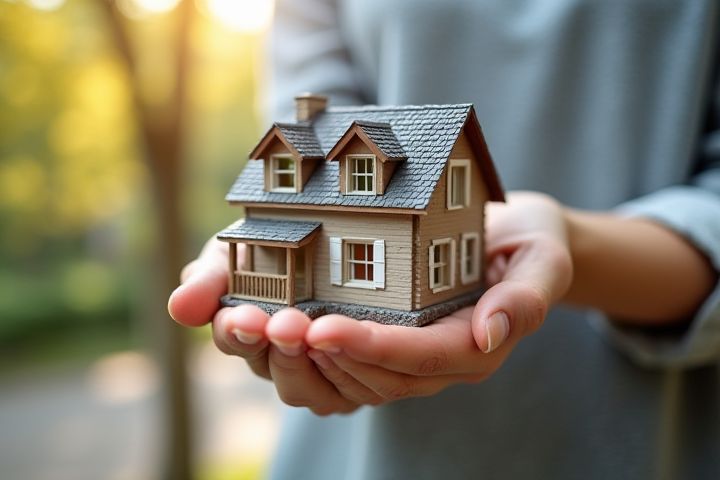
Numerous factors can significantly lower your house resale value. Poor property maintenance, such as neglecting repairs or allowing landscaping to deteriorate, showcases a lack of care that potential buyers may find unappealing. Location plays a vital role; homes situated near noisy highways or in flood-prone areas often experience decreased demand and value. Outdated interiors, including old appliances and worn-out fixtures, can also deter buyers, as many prefer modern, move-in-ready spaces. Lastly, high crime rates in your neighborhood can lead to lower buyer interest and, consequently, a reduced resale price.
What Lowers House Resale Value
Poor location
A poor location can significantly diminish your home's resale value, often by as much as 20% to 30%. Proximity to undesirable neighborhoods, high crime rates, or noisy industrial areas can deter potential buyers. School districts with low ratings or a lack of amenities such as parks and shopping centers further compound this decline. When evaluating a property's appeal, think about the long-term implications of location on future marketability and price.
Outdated design
Outdated design significantly lowers house resale value by making properties less appealing to potential buyers. Features such as old-fashioned cabinetry, outdated appliances, and uninspired color palettes fail to attract modern tastes, leading to limited interest and lower offers. Homebuyers often envision new, contemporary aesthetics, and properties that lack renovation can appear neglected, driving down perceived value. Updating design elements can enhance marketability and increase resale potential, reflecting your property's true worth.
Deferred maintenance
Deferred maintenance significantly lowers house resale value by creating potential red flags for buyers. Issues like leaky roofs, outdated plumbing, or worn-out electrical systems signal neglect, leading to increased buyer skepticism. When buyers perceive costly repairs looming, they often adjust their offers downward to compensate for the anticipated expenses. You should regularly address maintenance items to preserve your property's appeal and market value, ensuring a more favorable selling experience.
Bad curb appeal
Bad curb appeal significantly lowers a home's resale value by creating a negative first impression for potential buyers. Overgrown lawns, peeling paint, and neglected landscaping can make your property appear unkempt, deterring interest from those looking to invest. Features like a broken driveway or outdated exterior fixtures further diminish attractiveness, leading to lower offers or prolonged market time. Enhancing your home's curb appeal with simple upgrades, such as fresh paint or attractive landscaping, can effectively boost its market value and appeal to buyers.
Dysfunctional layout
A dysfunctional layout can significantly lower the resale value of your house by creating impractical spaces that fail to meet buyers' needs. Cluttered or poorly defined areas, such as inadequately sized rooms or awkwardly positioned entryways, can disrupt the flow of daily activities and deter potential buyers. Additionally, if the home lacks functional zones like an open living space or sufficient storage, prospects may perceive it as uninviting or uncomfortable. A well-considered layout not only enhances livability but also increases your property's market appeal and value.
Low energy efficiency
Low energy efficiency significantly undermines a home's resale value, as buyers increasingly prioritize sustainable living and cost-effective energy solutions. Homes with outdated insulation, inefficient windows, or old heating and cooling systems typically incur higher utility bills, making them less attractive in the competitive real estate market. Additionally, properties lacking energy-efficient certifications may be perceived as not meeting modern environmental standards, further deterring potential buyers. Investing in energy upgrades, such as ENERGY STAR appliances or solar panels, can enhance your home's desirability and overall market value.
Neighborhood decline
Neighborhood decline can significantly lower your house resale value due to various factors, including increased crime rates, deteriorating infrastructure, and reduced demand for properties. As local businesses close and amenities decrease, prospective buyers may be deterred, leading to fewer offers and lower selling prices. Urban decay, characterized by vacant properties and a lack of maintenance, further exacerbates this decline, diminishing the overall appeal of the area. Keeping an eye on neighborhood trends is crucial, as these elements play a vital role in determining your home's market value.
Homeowner association issues
Homeowners associations (HOAs) can significantly impact your property's resale value due to stringent regulations and fees. A poorly managed HOA may lead to negative perceptions, discouraging potential buyers who value autonomy and flexibility. High monthly dues or assessments associated with community upkeep can deter interested parties, especially if the benefits are not clearly communicated. Moreover, conflicts within the HOA, such as disputes over rules or maintenance issues, can create a stigma that hampers your home's appeal in the competitive real estate market.
Stigmas or history
Stigmas surrounding a property, such as being located on a busy street or near a hazardous site, can significantly impact its resale value. Historical events linked to a house, like a notorious crime or a tragic incident, often deter potential buyers, causing a dip in market interest. Homes with a troubled or negative history may see values decrease by as much as 10-20% compared to similar properties without such stigmas. Understanding these factors can help you make informed decisions when buying or selling real estate.
Zoning changes
Zoning changes can significantly lower your home's resale value by altering the intended use of properties within your neighborhood. A change from residential to commercial zoning, for example, can lead to increased traffic, noise, and a shift in community character, making your property less appealing to buyers. Additionally, the introduction of high-density developments in previously low-density areas can overwhelm local infrastructure, discouraging potential purchasers. Understanding these impacts is crucial, as a 10% decrease in property value can occur if local zoning regulations shift unfavorably.
